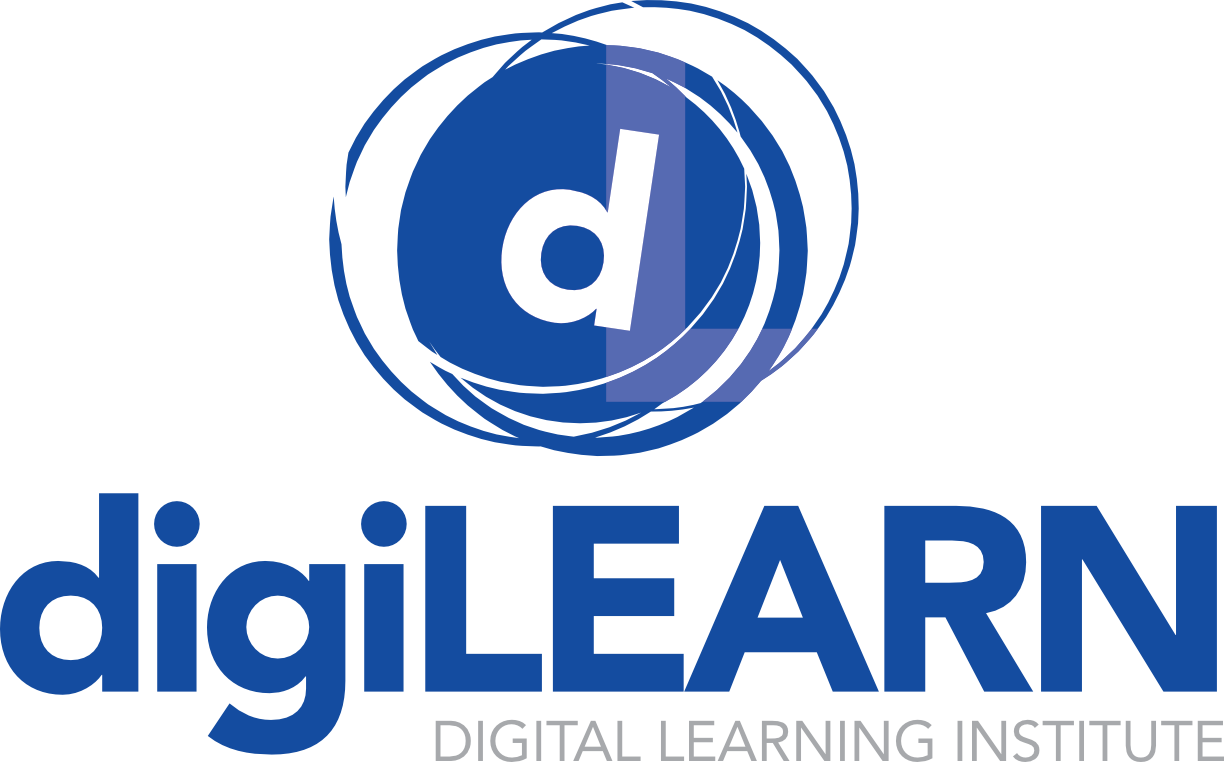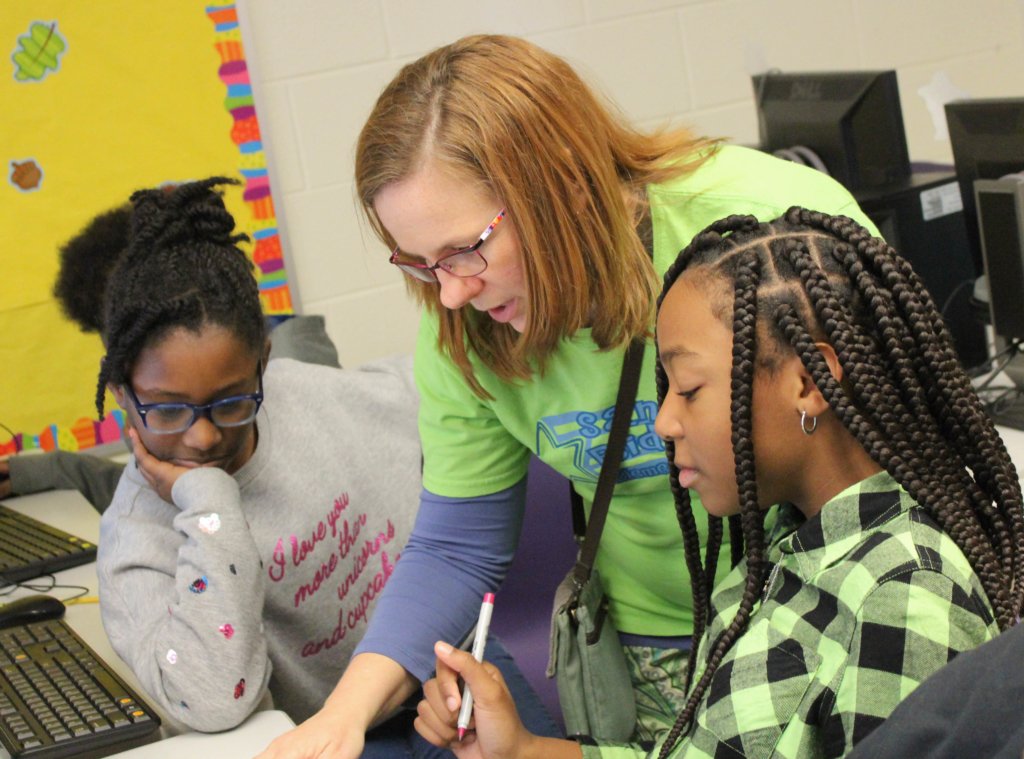EdNC: Digital Scholars Initiative Pilot Expands to Teachers in Durham
The following is a story by Yasmin Bendaas, which originally appeared on EdNC. For the original story, click here.
Last Tuesday, students at Sandy Ridge Elementary School in Durham sorted through a list of products they could bring with them on a hypothetical weekend camping trip. The catch: they had to limit their gear to 30 pounds. Plus, not all of the objects were listed in pounds. Some were in ounces and some included decimals or fractions, meaning students had to calculate conversions before adding up their units.
The class, taught by AIG teacher Lena Deskins, took place in the computer lab, so students completed their assignments on screen. Deskins said she has always integrated technology in her classes, including the use of Google Classroom, Google Documents, and spreadsheets.
“I want them to be able to show what they know, using the computer sometimes,” Deskins said. “I want them to be able to research knowledge that they want using the computer as well.”
Deskins’ work with digital and personalized learning led to her selection by district leaders in Durham Public Schools as a Digital Scholar. DigiLearn, a nonprofit dedicated to digital learning founded by former Gov. Bev Perdue, launched the Digital Scholars Initiative in 2016 to cultivate teachers as leaders and models for technology use in classrooms. The first pilot took place in Rowan-Salisbury Schools, and last October, DigiLEARN announced a second pilot with Durham Public Schools.
Digital Scholars teachers receive professional development, extended employment, and time outside the classroom to develop leadership and entrepreneurial skills necessary to turn their classrooms into digital “learning labs.” This means that other teachers in the district can work directly with Deskins to find inspiration and see activities that are different from a traditional classroom.
“Seeing that happening in your own district … is really powerful because it sends that message that ‘I could totally do that here. I could totally do that in my own classroom,’” said Emily Swartzlander, communications consultant for DigiLearn.
Deskins and Alexander Groff of Riverside High School, another teacher in Durham selected for the Digital Scholars pilot, also visited Sally Schultz’s “learning lab” classroom in Rowan-Salisbury Schools.
“I think it’s easy to get in this mentality of ‘I have to make this lesson. I have to grade,’ and there’s not a lot of room for a lot of other stuff,” Groff said. “So seeing Sally’s class, which was a completely different model, was really refreshing.”
One of Groff’s main takeaways from Schultz’s classroom was that students had required units for lessons, but also elements they had the flexibility to choose.
“In a traditional low-tech classroom, you follow one option and it’s the option the teacher chose, so you’re going to inherently leave people out,” Groff said.
Although it requires more work on the front end, Groff said building four or five lessons instead of one to give students options based on their different interests makes the lessons more experiential and engaging.
“To me, teaching world history, the interesting part is the world part — because there’s so much out there. There’s so much to know and be curious about,” Groff said. “But because of the way traditional classrooms work, there’s not a whole lot of freedom to explore.”
While Deskins and Groff will be adapting new blended learning techniques into their classrooms as Digital Scholars to engage their students, the initiative also works to engage Scholars through professional development opportunities. Swartzlander said the goal is to empower teachers to have more tools and knowledge that they are then able to use in the classroom.
“We’re getting ready to head to the blended learning conference in Rhode Island, so I think that will be really exciting, too,” Deskins said of the upcoming professional development opportunity in April. “I think that will have a really big impact on my classroom and my students.”
For Groff, this continued professional development is part of what he calls a “philosophy shift” in teaching.
“I feel like it’s our job as teachers to kind of back up and remember that it’s not just the grading and the getting through the content,” Groff said. “There’s so much more we can do that would be beneficial for us, and then we bring that enthusiasm and knowledge and content to the students, and it makes the whole experience better.”
Deskins and Groff entered the Digital Scholars Initiative after the Friday Institute for Educational Innovation partnered with DigiLearn to evaluate the original pilot in Rowan-Salisbury. In a report released last year findings showed that:
“Rowan-Salisbury Digital Scholars are master teachers that have a deep understanding of and highly advanced skills for using digital and personalized instructional strategies that lead to improved outcomes for students.
Learning Labs are a promising strategy for spreading effective digital and personalized learning instructional practices.
Teachers who visit Learning Labs gain useful knowledge, instructional ideas and inspiration, along with in-depth support from Scholars to implement new instructional strategies in their own classrooms.”
The evaluation also surveyed students in the classrooms of Digital Scholars and found that the “majority of students in the Scholars’ classrooms felt they learned more, enjoyed learning more, and took more responsibility for their learning when digital tools were used for self assessment and learning.”
Swartzlander said the initiative decided to expand into Durham Public Schools after the original pilot because of the district’s interest in technology in the classroom and because the more urban district adds variety to the Digital Scholars Initiative’s implementation.
“Our goal is to work with students regardless of geography, zip code, and socioeconomic status,” she said. “We believe that none of those should matter in terms of your ability to be connected to technology and innovative education.”
Photo: Lena Deskins and her students. Photo by Yasmin Bendaas, EdNC

